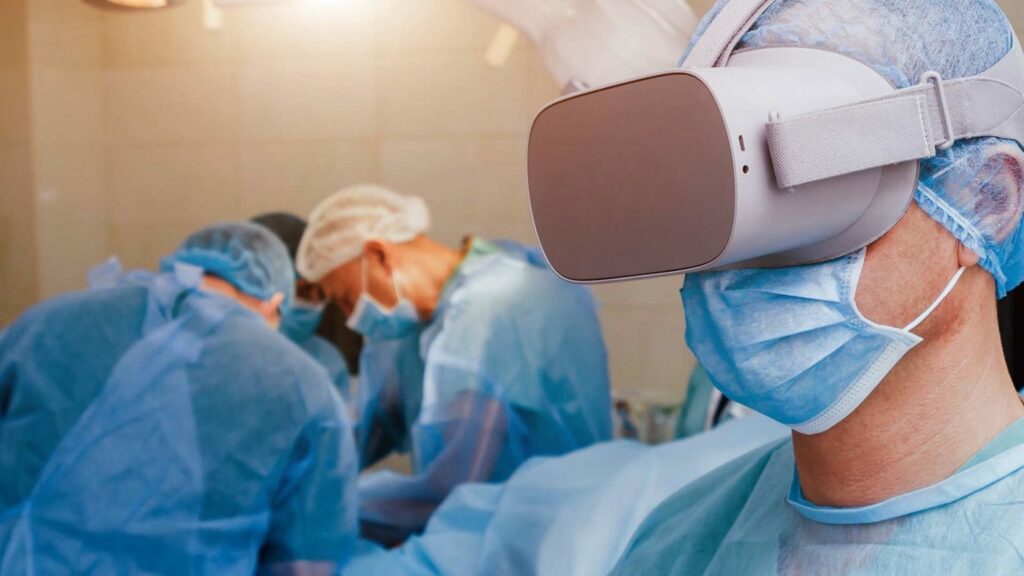VR Training and Surgery
Surgeons deal with complex procedures that in many cases can be a life or death situation regarding the patient. The lack of proper training can be correlated with adverse outcomes in the operating room. Virtual reality for the last 20 years has brought a degree of enhancement to the traditional training that medical professionals receive and even more so in the last five years as the VR training revolution has started to take off.
Enhancements to surgical training are no longer nice-to-have circumstances, they are a necessity. As our population ages surgical clinicians are going to become more in demand in fact one study projected a 35 to more than 80,000 surgeon shortfall by the year 2025. We are also finding that the traditional surgical training is not necessarily keeping up with the rapid rate of innovation and in fact, over 30% of the graduating residents are unable to operate independently with the latest robotic technology, again a lack of focus training.
Innovators using virtual reality or VR training for orthopedic surgery include the Mayo Clinic, the University of British Columbia, Western University, McGill University, the Boston shoulder Institute, and the University of Mississippi Medical Center with more to follow.
John Costouros, MD, at Stanford University is starting an initial trial in training graduating surgeons and comments that virtual reality offers more impact, creates value all by improving surgical skill and reducing errors in the operating room. The virtual patient is subjected to proper procedure and or potential error within the operating room and it allows residents to learn from those errors and possible mistakes.
Virtual reality training for surgery is far less expensive and much more impactful than training in a cadaver lab it enhances the decision-making process, creates a safe environment to practice and make mistakes, and ultimately fosters a high level of engagement in the training process.
In one example, the Johnson & Johnson Institute launched a VR training program focused on training orthopedic surgeons and nurses for standard practices within the realm of expertise. The program had a singular focus in looking at total knee replacement with the ultimate goal of creating better outcomes for the patient. This VR training program is being developed to focus on a number of surgical techniques and will allow surgeons and their support staff to train with a high degree of feedback, repetition, and flexibility in their focus on specific surgical techniques. The ultimate goal is not only a better patient outcome but also the ability to have a very consistent learning environment, and also to save time and money in the process of surgeons mastering a specific procedure or technique.
In the process of the Johnson & Johnson program, it was found that over 80% of the participating surgeons could see VR being used in other processes and procedures. In another questionnaire, over 90% would recommend VR training to their associates and peers. Further studies and pilot projects will add validation to the overall technology advancement in VR training for surgery, that said the initial results are extremely positive and hold great promise for the future.
So… What is the benefit of using VR training for surgical procedures in the enhancement for both medical students and veteran surgeons learning new processes and procedures? Fundamentally, it is not a break with traditional teaching methods, it is more an enhancement using technology in much the same way that we find our everyday lives enhanced by technology for example smartphones or access to the Internet, or personal assistance, or any other device that makes our lives easier or more efficient. If you think of virtual reality for surgical training you’re immersed in the aspect of the process or procedure you have multiple viewing angles, it feels as if you’re actually performing an actual procedure versus two-dimensional imagery such as pictures or video. This is not a replacement, it’s an innovation and as with most innovations, it takes a while to integrate that benefit into the overall training curriculum and the system of adult learning especially pertaining to medical professionals and surgeons.
We know that VR training offers a tremendous value in other fields ranging from workplace safety to football play out on the gridiron. Why would we think that that technology that can keep our workplace safer in the reduction of fatalities and injuries would not be applied to the medical field especially when you’re talking about virtual reality training for surgeons? And the answer is, absolutely we would use the technology for better outcomes in dealing with medical students, residents, and even veteran surgeons when it comes to applying this new technology to learning new processes or procedures or to learn new medical techniques that are especially based on technological innovation.
So… Should VR training be used in conjunction with training surgeons? And the answer is absolutely
If you check the information below, you can schedule a call with us. We offer free 30 minute sessions to be able to find out what your needs are and how technology can help your organization. Also… hit our website, because there’s a lot of information that you can gain just by checking our site. Thank you.


